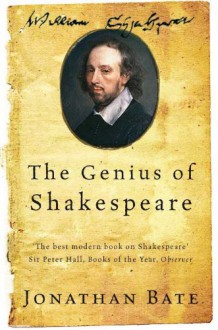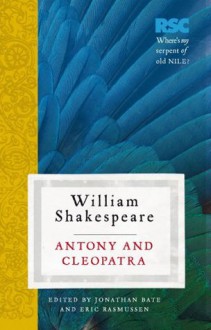
Jonathan Bate is one of the RSC's resident clever people, and "The Genius of Shakespeare" is his discussion of What's So Great About Shakespeare Anyway.
The first half is a biography of Shakespeare focusing on his literary influences and the innovations he introduced. I was very interested in getting to the point and found this frustrating. Bate said at the end of the book that he intended to show his workings as a way of presenting his argument, rather than explaining the conclusions he had come to directly to the reader. I like that in theory, and it was very effective in the second half, but I was frustrated because I wanted to read about the problems around the idea of Shakespeare-the-genius and instead was presented with several hundred pages of well-argued, interesting literary biography.
The second half was about what I was interested in. Why do we associate Shakespeare with genius? What do we mean by "genius"? When did the meme of "Shakespeare, the genius" start, and why?
First, Shakespeare was praised for his supposed artlessness and natural talent. Ben Jonson's "little Latin and less Greek", Bate argues, was actually Jonson complimenting Shakespeare, that his friend was so naturally talented he could create great works without a university education. In the eighteenth century English nationalists picked him up as a counter to French neoclassical plays, which demand the three unities. Voltaire hated Shakespeare (the French translation was terrible, and it makes sense that French wouldn't be too keen to create a very good version, a stick to beat themselves with) and Shakespeare's messy, bursting-out plays vs the tight, stylistic tragedies of Racine et al was a way for English and French nationalism to seep into cultural arguments. Bate writes: "The veneration of Shakespeare as English national poet was in the first place a response to a patronizing and disparaging attitude towards his works on the part of French critics and a Francophile court taste."
The Romantics latched onto the idea of Shakespeare attuned to nature, inventiveness flowing like the Avon, and sonnets flowing from his tortured love-stricken soul. Bate says, "When Romantics get their hands on Shakespeare’s sonnets, the trouble begins." Authorship raises its head in the nineteenth century, for two reasons: for the first time, Shakespeare was more popular, and differently popular, than any other cultural figure; and the Romantic idea that a writer is directly expressing their own emotions.
Bate also traces Shakespeare's influence on non-English culture, like Berlioz and Césaire. He argues that what he calls the New Iconoclasts - people who argue Shakespeare's global influence is the imperialist hand of Dead White Male Culture - are themselves suppressing global artists who have consciously chosen to engage with Shakespeare as part of their own culture.
To the question why is Shakespeare a genius, Bate has several ideas, most coming down to successful plurality of voices.
- Drama is the only medium for "genius" in the way we mean, because it's the only medium in which many discrete and dissenting voices can be represented with equal weight.
- Shakespeare is the only English-language dramatist to successfully represent such a wide range of different voices - across classes, genders, philosophies, every aspect and perspective of life and situation.
- He has become a global 'genius' because a broader range of people across the world in history have been able to consume English-language culture than any other language. This is the result of imperialism, but that doesn't make it not part of other cultures. When you transmit your culture to the groups you oppress, you lose control of it, and it becomes theirs just as much as it is yours.
So Bate says these are the ingredients for what we perceive as genius:
Dramatist; plurality of an extremely wide range of voices; 300+ years old (for works to be tested in many different times and places and still speak to us); in the language of the world's majority/imperialist culture.
Bate thinks that if Spain had successfully become the major imperialist power instead of England, Lope de Vega would be "the world's genius", as he fits all of the above except the last one.
This is an extreme oversimplification of Bate's argument and ideas (he firmly says they are not "conclusions"), but it gave me a lot to think about. Particularly the ideas about imperialist culture being validly and equally part of oppressed people's culture as the imperial one; I hadn't thought about it in that way before.
He's also quite funny; here are some quotes I noted while reading:
"Richard II’s relationship to Edward II is so obvious that it is not very interesting."
On the anecdote about "William the Conqueror came before Richard III": "Shakespeare, with his usual eye for the main chance, pops in between the erection and Burbage’s hopes"
"There is a mystery about the identity of William Shakespeare. The mystery is this: why should anyone doubt that he was William Shakespeare, the actor from Stratford-upon-Avon?"
I love this:
"Pistol is a constant reminder that the price of Harry’s greatness is the rejection of Falstaff."
"But the point about Arthur’s bosom is that it is an earthly, an English, and a temporary resting place: the conceit is that Falstaff will rest with Arthur under Glastonbury Tor not for all eternity but until the land has need of him again, when he will return."


 Log in with Facebook
Log in with Facebook 







